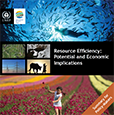
 15 May 2016: Ambitious action on climate change and more efficient natural resource use could achieve significant cuts in greenhouse gas (GHG) emissions and increase economic growth, according to a report released by the International Resource Panel (IRP) in the lead up to the Group of 7 (G7) leaders meeting in Japan. The report assesses prospects and solutions for resource efficiency and considers how more efficient resource use can contribute to economic growth, employment and development and reduce use of materials, energy, biomass and water. Also requested by G7 leaders and released recently is an Organisation for Economic Co-operation and Development (OECD) publication, titled ‘Policy Guidance on Resource Efficiency.’
15 May 2016: Ambitious action on climate change and more efficient natural resource use could achieve significant cuts in greenhouse gas (GHG) emissions and increase economic growth, according to a report released by the International Resource Panel (IRP) in the lead up to the Group of 7 (G7) leaders meeting in Japan. The report assesses prospects and solutions for resource efficiency and considers how more efficient resource use can contribute to economic growth, employment and development and reduce use of materials, energy, biomass and water. Also requested by G7 leaders and released recently is an Organisation for Economic Co-operation and Development (OECD) publication, titled ‘Policy Guidance on Resource Efficiency.’
Group of 7 (G7) leaders requested the report within the context of their efforts to promote resource efficiency as a core element of sustainable development. A summary report, titled ‘Resource Efficiency: Potential and Economic Implications: Summary for Policy-Makers,’ was released at the G7 Environmental Minister’s Meeting (EMM) in Toyama, Japan, on 15 May 2016. The full report will be released later this year.
Natural resource extraction will increase from 85 to 186 billion tonnes over the next 35 years if existing trends, such as an increasing population, urbanization and an expanding middle class, continue, the report explains. It suggests that effective resource efficiency policies and climate action could: reduce global resource extraction by up to 28% by 2050; cut GHG emissions by 74% by 2050 relative to 2015 levels; and increase gross domestic product (GDP) by 1% in the G7 countries and globally. The report argues that addressing climate change and promoting efficient resource use can generate increased economic output and employment and contribute to achievement of the Paris Agreement on climate change and the Sustainable Development Goals (SDGs).
Markets will be unable to achieve higher rates of resource efficiency on their own, according to the report. It finds that greater investment in resource-efficient infrastructure and products and “intelligent, targeted” regulation will be required. The report also documents examples of best practices for increasing resource efficiency among different sectors from various countries.
The UN Environment Programme (UNEP) hosts the IRP, which is composed of scientists and experts in natural resource management. IRP provides advice to and connections among policymakers, industry and the community on ways to improve global and local resource management.
Also released at the EMM was the Organisation for Economic Co-operation and Development (OECD) publication, titled ‘Policy Guidance on Resource Efficiency.’ This report: states that advanced economies can do more to design and produce goods using fewer natural resources and producing less waste; calls on governments to apply resource-efficiency policies to the entire life cycle of products and to align them with existing policies in areas like innovation, investment and trade; and says more harmonization of environmental labeling and information could raise resource-efficient standards.
G7 countries’ resource consumption has remained the same since 1980, despite economic growth, although per capita consumption is approximately 60% above the world average. Speaking at the launch, OECD Deputy Secretary-General Rintaro Tamaki called for realizing a circular economy where the value of products and materials are maintained for as long as possible and waste generation is minimized.
The OECD report: finds that measures have been applied more to the downstream than the upstream part of products’ lifecycles; advocates for encouraging greener product designs and more environmentally friendly consumer behavior; and advises on extending policies to cover entire product lifecycles. The report also recommends: strengthening and expanding Extended Producer Responsibility schemes where manufacturers take responsibility for collecting and treating end-of-life products; better integrating resource-efficiency considerations into public procurement programmes; encouraging partnerships among businesses working along value chains; and improving data collection and analysis to evaluate and improve policies.
[IRP Publication: Resource efficiency: Potential and economic implications: Summary for Policy-Makers] [UNEP Press Release] [OECD Publication: Policy Guidance on Resource Efficiency] [OECD Press Release] [IRP Publications Website] [UNEP Knowledge Repository]